Project description: Conservation and monitoring of nesting hawksbills and their nests.
Location: Bocas del Toro Province, Panama, Bastimentos Island National Marine Park (BINMP): Zapatilla Cays and Playa Larga
Project Dates: 27 April – 2 November 2021.
Due to training requirements and logistical challenges, all RA’s must commit to a minimum two-month stay. Special consideration for RA’s who can start as early as 27 April or who are able to stay until 2 November.
Applications will be accepted until all positions are filled.
Project summary:
Since 2003, Anne and Peter Meylan have worked in partnership with the Sea Turtle Conservancy (STC) to monitor important Panamanian sea turtle nesting beaches in Bocas del Toro Province and the Comarca Ngäbe Buglé, from the Changuinola River (border with Costa Rica) to the Chiriquí River. Four sea turtle species are found in the waters of Bocas del Toro and the Comarca; Leatherback (Dermochelys coriacea), Hawksbill (Eretmochelys imbricata), Green (Chelonia mydas) and Loggerhead (Caretta caretta). Within this region, we have standardized monitoring, research and protection efforts in collaboration with STC and members of local communities close to the nesting beaches. This program has had very positive results. More than 1000 hawksbill nests were recorded in the BINMP in each of the last two nesting seasons. In the last 15 years, there has been a reduction in the illegal killing of turtles on the majority of nesting beaches in the area, and an increasing nesting trend for Hawksbill turtles. Despite these advances, numerous threats remain for the sea turtles within and adjacent to BINMP, including increasing pressure on coastal and marine habitats through unregulated tourism development and the continued hunting of turtles for personal consumption and commercial purposes both on the beach and within park waters.
Additional information and about how to apply can be found on the STC website.
Click here for Spanish version
Project description: Conservation and monitoring of critically endangered green turtles
Location: STC Field Station, Tortuguero, Costa Rica
Dates:
Group 1: June 7 – August 24, 2021
Group 2: August 12 – November 1, 2021
Application Deadline: March 12, 2021
Project summary:
Research and monitoring of sea turtles in Tortuguero, Costa Rica was initiated in the 1950´s by legendary sea turtle researcher Dr Archie Carr. Dr Carr continued his work in Tortuguero until his passing away in 1987 and each year from June – November Sea Turtle Conservancy (STC) conducts the Green Turtle Program, continuing the work started by Dr Carr. STC works closely with Costa Rican authorities, the Tortuguero community and other sea turtle conservation organizations in the country. Information collected during the annual Green Turtle Program plays a key role in developing effective management strategies for sea turtles in the area.
Green Turtle RA Application 
Green Turtle RA Application (Word doc)
Click here for Spanish version
Location: Bocas del Toro Province and Comarca Näbe Buglé, Panama
Dates: June 29– September 17, 2021
Application Deadline: March 5, 2021
Project summary:
Since 2003, STC (Sea Turtle Conservancy) has worked at important Panamanian sea turtle nesting beaches in the Bocas del Toro Province and the Comarca Ngäbe Buglé, from the Changuinola river to the Chiriquí river. Four sea turtle species are found in the waters of Bocas del Toro and the Comarca; Leatherback (Dermochelys coriacea), Hawksbill (Eretmochelys imbricata), Green (Chelonia mydas) and Loggerhead (Caretta caretta). Within this region STC has standardized monitoring, research and protection efforts in collaboration with members of communities close to the nesting beaches. In addition, education and awareness programs have been developed to highlight the importance of protecting and conserving sea turtles and other natural resources. This program has had very positive results. In the last 12 years there has been a reduction in the illegal killing of turtles on the majority of nesting beaches in the area, and an increasing nesting trend for both Leatherback and Hawksbill turtles. Despite these advances, numerous threats remain for the region’s sea turtles, including predation of nests by domestic dogs, increasing pressure on coastal and marine habitats through unregulated tourism development, and the continued hunting of turtles for personal consumption and commercial purposes.
Panama RA Application (Word)
Introducing the winning photos from our 2021 Sea Turtle Calendar Contest! Thank you so much to everyone who entered this year’s contest. It gets harder every year to narrow down hundreds of beautiful images to only 13 photos! Calendars will be for sale in our online gift shop in November. We will post the link once they’re live.
COVER PHOTO – BEN HICKS
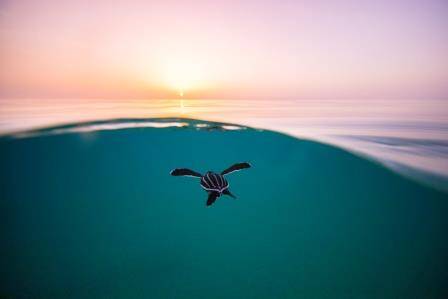
JANUARY – MARIO CISNEROS

FEBRUARY – ADHITH SWAMINATHAN
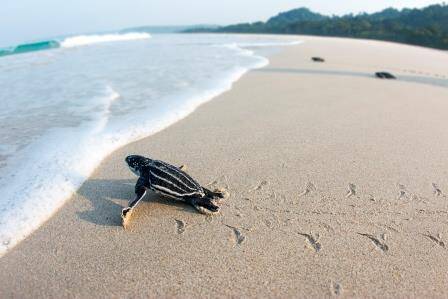
MARCH – HECTOR CHENGE

APRIL – KATHY WIANKE

MAY – BARBARA SELLES
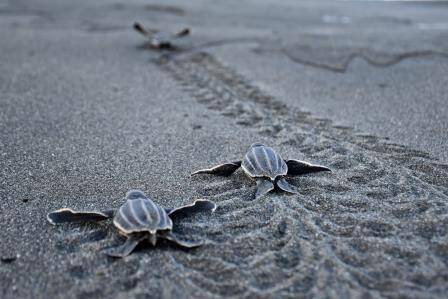
JUNE – KARLA G. BARRIENTOS MUNOZ

JULY – CHRISTIAN MARTINEZ
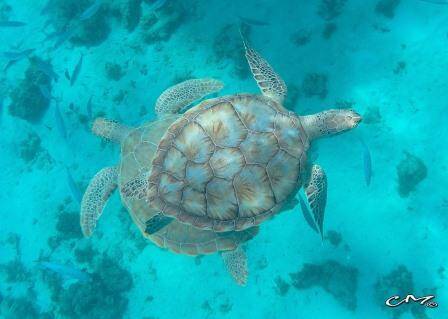
AUGUST- MARIO CISNEROS

SEPTEMBER – ADHITH SWAMINATHAN

OCTOBER – RALPH PACE

NOVEMBER – ARGHYA ADHIKARY

DECEMBER – STEFANIE PLEIN

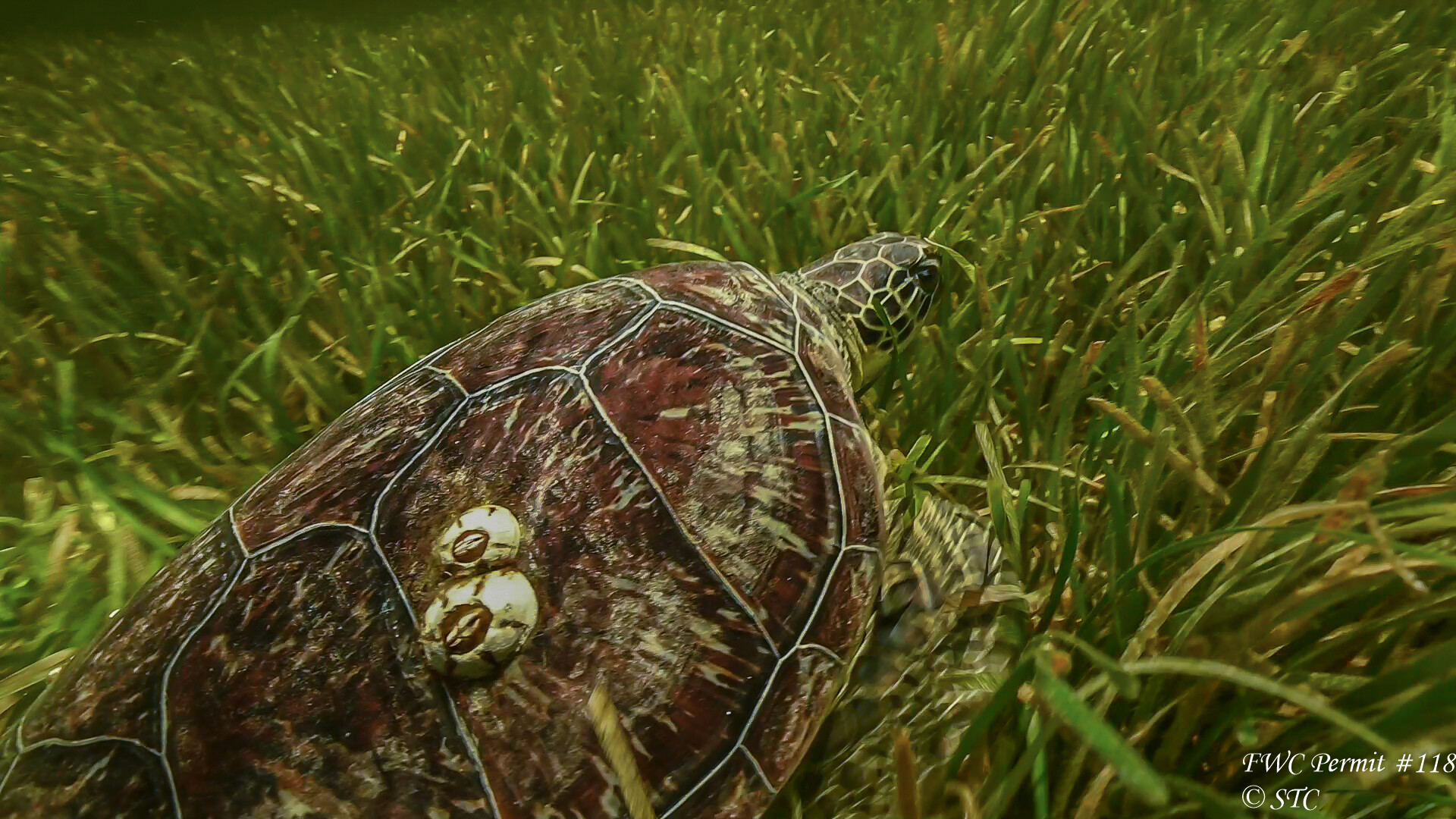
The coastal waters off of Florida’s Big Bend are a developmental habitat for juvenile sea turtles. Pictured here is a juvenile green turtle exploring a shallow seagrass bed.
In May 2019, Florida Governor Ron DeSantis signed Section 338.2278, which created the Multi-Use Corridors of Regional Economic Significance (M-CORES) Program. This program proposes that the Florida Department of Transportation (FDOT) build three new toll highways, which would permanently destroy some of the last remaining wild stretches of coastline in Florida.
One of the three proposed roads, the Suncoast Connector, would slice through the Big Bend coastal region of northwest Florida and cause irreparable harm to the area’s pristine coastal waters and productive seagrass habitat. Through its In-Water Research Project, Sea Turtle Conservancy (STC) studies and protects the juvenile turtle populations that grow up along this coastline. The shallow seagrass beds in this region of Florida are a globally-important developmental habitat for young green, loggerhead and Kemp’s ridley sea turtles. Juvenile turtles spend their time foraging and growing up in this area until they reach maturity. When they leave the Big Bend, they become essential components of the marine ecosystems around Florida and throughout the Caribbean and Central America.
The fragile turtle nursery of the Big Bend exists because of the region’s relative lack of development. The Nature Coast is one of the few places in Florida where annual red tide blooms are not observed because of the degraded water quality. Seagrass is declining worldwide largely due to human impacts. Yet, the Nature Coast contains 1,200 square miles of seagrass habitat, which is the second largest area of its kind in the eastern Gulf of Mexico. These shallow water communities are home to thousands of invertebrates, fish and turtles, many of which depend on seagrass for protection and food. However, this habitat is incredibly vulnerable to runoff and other impacts from overdevelopment, which inevitably will occur if these massive highways move forward.
Iconic rivers, including the Suwannee, Withlacoochee, Steinhatchee and Aucilla, would be forever impacted by these proposed toll roads. Runoff from highways and associated development in the area would leech into waterways and pollute nearby coastal waters, putting juvenile turtles at risk from degraded water quality and disease. Fibropapillomatosis, a tumor-causing disease afflicting juvenile turtles is directly correlated with runoff from roads, septic tanks and other kinds of development sprawl these highways would bring to the region. The Nature Coast’s juvenile turtles and so many other forms of ecologically and economically important coastal wildlife will be in the crosshairs if these unnecessary highways move forward.

The proposed path of each toll road, seen here, will cut through some of Florida’s last remaining wild places. Credit: FDOT
For the past year, the three toll roads have been studied by task forces comprised of state and local governments, environmental groups, water management districts and non-profit organizations. In September, each task force released its findings and concluded that none of these tolls roads are needed. Instead, the task forces recommended that the FDOT focus on updating existing roads. Cornell Consulting, a firm contracted by the No Roads to Ruin Coalition, found that each toll road was “financially infeasible.” The construction of the roads alone will cost an estimated $10.3 billion over the next ten years.
These proposed highways are not yet set in stone. The State of Florida has the ability to adopt a “no build” option, which would remove the
MCORES Program from the FDOT’s Five Year Work Plan. STC is asking its members and supporters to help us save one of Florida’s last wild stretches of coastline by voicing your opposition to the M-CORES toll highways.
The FDOT is accepting public comment on each task force’s final report until Wednesday, October 14. The final findings will be delivered to Governor DeSantis on November 15.
You still have time to submit a comment opposing the roads online. Please take a minute to voice your opposition to the Suncoast Connector. Simply click this link and scroll to the bottom of the page to submit a comment voicing your opposition: https://storymaps.arcgis.com/stories/5c2d25cdbcf34ecc97b9a7b4ba5b2b10
Sea Turtle Conservancy (STC) recently kicked off its 13th annual Tour de Turtles migration marathon! The Tour de Turtles is a fun, educational journey that follows the migration of sea turtles from their nesting beaches to their foraging grounds. Through the use of satellite telemetry, STC will track 15 sea turtles, including leatherbacks, loggerheads, greens and one hybrid green/hawksbill, to determine how far they swim. The one to swim the furthest distance by October 31 “wins.”
Each turtle is also swimming to raise awareness about the threats sea turtles face. These threats include light pollution, beach erosion, marine debris, oil spills, commercial fisheries, illegal hunting, invasive species predation, climate change and more. The data collected during the Tour de Turtles helps researchers, conservationists and governing agencies make more informed decisions about sea turtle conservation methods and policies. Since the launch of the Tour de Turtles in 2008, STC has tracked more than 200 turtles.
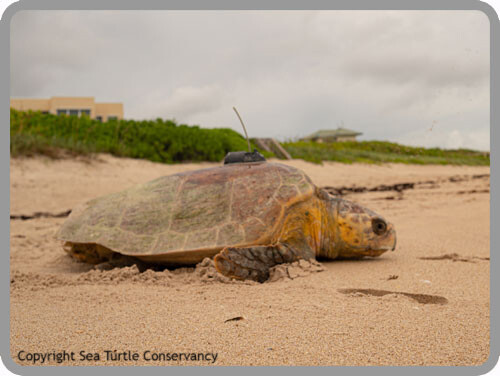
This year’s Tour de Turtles is special for several reasons… For the first time ever, it is comprised entirely of turtles from Florida. This is also the first time STC has tracked leatherbacks from Florida, thanks to a partnership with Florida Leatherbacks, Inc. Typically the organization travels to Panama, Costa Rica, Cuba, Nevis and other international sites to satellite tag turtles but was limited to Florida due to COVID-19.
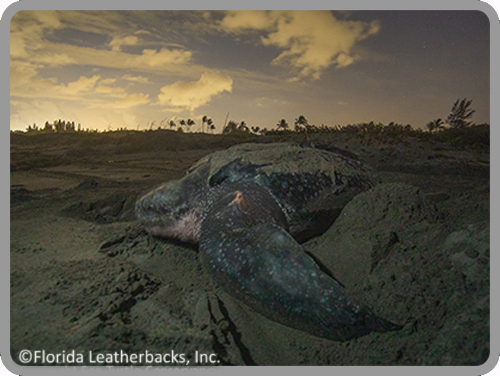
You can support the turtles by “adopting” them or sharing on social media to help raise awareness! Learn more about the turtles and follow their migrations at www.tourdeturtles.org. You can also purchase a Tour de Turtles 2020 t-shirt by clicking here or below!
Sea Turtle Conservancy’s research and conservation program at Tortuguero, Costa Rica, is a conservation success story. When STC’s founder Dr. Archie Carr first arrived at the site in the 1950s, the green turtle population was in drastic decline—slipping toward extinction—due to the unsustainable harvesting of nesting turtles. Over the next six decades, a sustained research, education and conservation program has been carried out by STC, in close partnership with the community of Tortuguero and the Government of Costa Rica. Through the combined efforts of everyone involved, the unsustainable harvesting of sea turtles was eliminated and replaced with a local economy built on ecotourism. Once protected, the turtles responded by recovering to the point of being the largest remaining colony of green turtles (Chelonia mydas) in the Western Hemisphere (and probably the world), and STC’s program at Tortuguero has become a global model for how sea turtles can be saved. Unfortunately, a situation is unfolding in Tortuguero due to COVID-19 that jeopardizes much of the success that has been achieved to recover this globally-important sea turtle population.

Because Costa Rica’s borders are closed to foreign visitors for the foreseeable future, nearly all of STC’s international Research Assistants, who assist with carrying out our research and protection program, are unable to get to Tortuguero. Even if the borders open later this summer, most of our previously-committed volunteers have had to make other plans. As a result, STC’s small crew of staff members in Tortuguero have been thrust onto the front lines of wildlife protection, performing tasks that once were carried out by a team of 25 people. STC also has seen the complete loss of revenue we count on from our Visitors’ Center gift shop and an eco-volunteer program we normally conduct at our research station. Meanwhile, the presence of Costa Rican law enforcement on the beach at Tortuguero has dwindled significantly, at the same time the threat of illegal hunting is skyrocketing due to the collapse of ecotourism in the country. Without the typical presence of park guards, tour groups and tourists on the beach in Tortuguero, STC is documenting significant increases in illegal poaching of adult turtles and nests. This alarming trend, combined with the complete lack of revenue being generated in Tortuguero, is STC’s biggest programmatic challenge resulting from the pandemic.

Our staff members are working overtime day and night to deter turtle hunters from killing turtles as they crawl ashore to nest, and we are doing our best to hide nests in order to protect the eggs from being taken. While the calamity unfolding in Tortuguero is not on the same level as what has been confronting healthcare and other front-line workers serving people in the US and abroad, STC’s dedicated staff Tortuguero is manning the front line of defense on behalf of imperiled sea turtles that are under greater threat because of the impacts of the pandemic.
In honor of World Sea Turtle Day (June 16), a date selected because it is Archie Carr’s birthday, STC asks for your support. Please help us sustain the critical work taking place in Tortuguero to ensure that the incredible progress made on behalf of sea turtles over the last six decades is not jeopardized as a result of this pandemic. Your donation will directly support STC’s ability to hire additional Costa Ricans to fill the void created by our lack of international volunteer Research Assistants. Donations will also be matched up to $5,000 through June 16.

This need is urgent and timely, as green turtle nesting is now underway. A single season of rampant illegal harvesting of adult turtles can severely jeopardize the recovery of green turtles at Tortuguero—one of the world’s great conservation success stories. With your help, we will have the ability to ensure that this does not happen. Click here to donate now.
For more information about STC’s work in Tortuguero, click here: http://stcturtle.org/stc-programs-research-tortuguero-costa-rica/.
Sea Turtle Conservancy (STC) is proud to announce another top rating from Charity Navigator, the leading evaluator of non-profit groups in the United States. STC received 4 out of 4 stars for the 13th year, indicating that our organization adheres to good governance and other practices that minimize the chance of unethical activities and consistently executes our mission in a fiscally responsible way.
“The Board and staff of Sea Turtle Conservancy take great pride in our consistent high ratings from Charity Navigator,” said David Godfrey, STC Executive Director, “and it gives our donors confidence that their contributions are being managed wisely to the maximum benefit of sea turtles.”
According to Charity Navigator, a 4 star rating is an ‘exceptional’ designation, and differentiates Sea Turtle Conservancy from its peers and demonstrates to the public it is worthy of their trust. STC spends almost 90 cents of every dollar donated directly on research, conservation and education programs. STC’s commitment to transparency, good governance and fiscal responsibility ensures that donations are used in an efficient manner to support conservation programs.
 “We are proud to announce Sea Turtle Conservancy has earned our fourth consecutive 4-star rating,” says Michael Thatcher, President and CEO of Charity Navigator. “This is our highest possible rating and indicates that your organization adheres to sector best practices and executes its mission in a financially efficient way. Attaining a 4-star rating verifies that Sea Turtle Conservancy exceeds industry standards and outperforms most charities in your area of work. Only 20% of the charities we evaluate have received at least 4 consecutive 4-star evaluations, indicating that Sea Turtle Conservancy outperforms most other charities in America. This exceptional designation from Charity Navigator sets Sea Turtle Conservancy apart from its peers and demonstrates to the public its trustworthiness.”
“We are proud to announce Sea Turtle Conservancy has earned our fourth consecutive 4-star rating,” says Michael Thatcher, President and CEO of Charity Navigator. “This is our highest possible rating and indicates that your organization adheres to sector best practices and executes its mission in a financially efficient way. Attaining a 4-star rating verifies that Sea Turtle Conservancy exceeds industry standards and outperforms most charities in your area of work. Only 20% of the charities we evaluate have received at least 4 consecutive 4-star evaluations, indicating that Sea Turtle Conservancy outperforms most other charities in America. This exceptional designation from Charity Navigator sets Sea Turtle Conservancy apart from its peers and demonstrates to the public its trustworthiness.”
STC’s rating and other information about charitable giving are available free of charge on Charity Navigator’s website here.
The Sea Turtle Grants Program (STGP), funded by the sale of Florida’s “Helping Sea Turtles Survive” specialty license plate, recently awarded $340,439.60 to 20 different projects benefiting Florida sea turtles as part of the 2020-2021 grant funding cycle.

Each year, the Sea Turtle Grants Program distributes money to coastal county governments, educational and research institutions and nonprofit groups through a competitive application process. The sea turtle specialty license plate is also the primary source of funding for the Florida Fish and Wildlife Conservation Commission’s Marine Turtle Protection Program.
The following organizations received grants for their approved projects for the 2020-2021 cycle:
The sea turtle plate is the number two overall selling specialty tag in Florida, and the number one environmental specialty plate. By purchasing the sea turtle specialty license plate, Floridians are voluntarily funding important programs to save endangered sea turtles and their habitats.
To learn more about the Sea Turtle Grants Program and the “Helping Sea Turtles Survive” specialty license plate, please visit www.helpingseaturtles.org.
**UPDATE: Unfortunately, the public lost the vote, 3-2. Thank you to everyone who sent emails, made calls and attended the meeting. 15 people spoke for the changes, and 1 developer spoke against them. If nature and conservation groups unite to make changes to the local government, we have a chance of preserving a legacy for future generations….otherwise, it will only get worse, and all the work we’ve done will be for naught. “They paved paradise, put up a parking lot” as Joni Mitchell sang in 1970.**
———-
There is a rare opportunity to reduce the impact of a highly destructive “loophole” in Brevard’s laws governing Specimen and Heritage trees at an upcoming commission meeting.
Before It’s Too Late! Let’s Save Brevard’s Remaining HERITAGE and SPECIMEN Trees
Why would Brevard County adopt a thorough, 28-page Land Clearing and Tree Protection Policy and include a single sentence, in Section 62-4334, that EXEMPTS 299,508 properties (90%) from following the policy? The result is that a large part of our county’s tree canopy (any property less than one and one-quarter acres), including heritage and specimen trees, can be clear cut at the whim of owners. Think about that for a minute…
Towering 100-year-old Live Oaks, Pin Oaks and Scrub Oaks are being cut down every day. 50-foot tall Sea Grapes, Coconut Palms, Bottle Palms, Royal Palms, Washingtonians and any other trees can be cut down for any reason, or no reason at all, under Brevard county law … No Permits Required!

This Brevard Co. property clear cut and replaced native trees with grass and pavers, which will now funnel even small amounts of rain and flooding first to A1A, and then the Indian River Lagoon.
After extensive discussions with Brevard County Commissioners and Natural Resources staff about the best means to reduce this destruction, the Commissioners will be voting Tuesday, March 10, on a “Legislative Intent” to amend the Specimen tree ordinance. This amendment reduces the exempt properties from 1 ¼ acres to 1/4 acres and achieves the following:


Sea Turtle Conservancy strongly supports this proposed revision to Brevard County’s tree ordinance, which would remove an exemption that allows many beachfront property owners to indiscriminately chop down large coastal scrub oaks, mature sea grape trees and other large coastal trees that play a critical role in stabilizing dune habitat and minimizing erosion following storms. The coastal vegetation to be protected by this new ordinance also helps shield important sea turtle nesting sites from artificial light coming from beachfront developments. In short, this revised ordinance will help protect some of the most important sea turtle nesting habitat in the world from the reckless removal and clear-cutting of coastal vegetation – a practice that worsens the rate of coastal erosion, especially in a time of increased storm activity and sea level rise associated with climate change, and exposes sea turtles and their hatchlings to greater levels of light pollution.
Meeting Date: Tuesday, March 10 @ 5pm
Location: Brevard County Gov’t Center, 2725 Judge Fran Jamieson Way, Bldg C, Viera


E-mails are very important if you are unable to attend the meeting. You do NOT have to be a resident of Brevard County to speak up about this issue. Please pick any or all of the 7 items above as the basis of and e-mail to all 5 Commissioners:
I Support an Amendment to reduce to 1/4 acres, or eliminate, the exemption on the cutting of our trees in Section 62-4334 of Brevard Code.
E-Mail to: d1.commissioner@brevardcounty.us for Rita Prichett 321-607-6901
d2.commissioner@brevardcounty.us for Brian Lober 321-454-6601
d3.commissioner@brevardcounty.us for John Tobia 321-633-2075
d4.commissioner@brevardcounty.us for Curt Smith 321-633-2044
d5.commissioner@brevardcounty.us for Kristine Isnardi 321-253-6611
Together we can make this happen!
Overview and Purpose
Sea Turtle Conservancy (STC) is based in Gainesville, Florida, and was founded by renowned sea turtle expert Dr. Archie Carr. STC is the oldest and one of the most accomplished sea turtle conservation organizations in the world. STC is hiring a Senior Accountant to assist the STC Controller in managing and accounting for projects in the US, Costa Rica, Panama, and the Caribbean.
Duties and Responsibilities
This position is full time, based in our Gainesville, Florida office. Accounting tasks will be many and varied, under the direct supervision of the Controller. They will include:
Minimum Qualifications
Salary and Benefits
Applications will be accepted until a candidate is selected. Apply by submitting your cover letter and resume to the Controller, Pat McCloskey, at pat@conserveturtles.org.
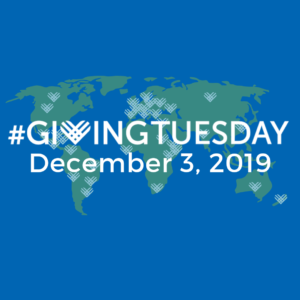 On December 3, Sea Turtle Conservancy (STC) is participating in our 7th annual Giving Tuesday to raise $50,000 for our Research Station in Soropta Beach, Panama! STC is hoping all of its members and supporters will participate in this year’s Giving Tuesday Campaign, which seeks to raise matching funds for the critical work we are doing at Soropta Beach to protect and recover leatherback sea turtles. Giving Tuesday, which occurs the Tuesday after Thanksgiving, is to remind people to take a moment to contribute to non-profit organizations in their communities and around the world.
On December 3, Sea Turtle Conservancy (STC) is participating in our 7th annual Giving Tuesday to raise $50,000 for our Research Station in Soropta Beach, Panama! STC is hoping all of its members and supporters will participate in this year’s Giving Tuesday Campaign, which seeks to raise matching funds for the critical work we are doing at Soropta Beach to protect and recover leatherback sea turtles. Giving Tuesday, which occurs the Tuesday after Thanksgiving, is to remind people to take a moment to contribute to non-profit organizations in their communities and around the world.
For Giving Tuesday last year, STC supporters helped generate over $40,000 to support STC’s in-water research program benefiting juvenile turtles in the Gulf of Mexico. The year before (2017), our supporters raised nearly $20,000 for the Tour de Turtles education program. STC has set its sights even higher this year, and we are confident we can reach the goal of $50,000 thanks to generous pledges from STC’s Board of Directors to match up to $25,000 for every dollar donated by STC’s members and supporters.

STC asks for your help to support one of our most urgent conservation programs. Every bit of the funding raised during the 2019 Giving Tuesday Campaign will support leatherback monitoring and protection efforts at a critical nesting site for this species at Soropta Beach, Panama. Soropta is a remote, 8 km black-sand beach that sees between 500 and 800 leatherback nests each season – making it an important part of the 4th largest nesting colony for this species in the world. Unfortunately, the area’s remoteness makes Soropta highly vulnerable to illegal hunting. STC’s presence on this beach since 2013 has helped curb illegal harvesting, but it’s still an ongoing problem.
By raising up to $50K to support this project, STC will be able to secure additional beach monitors and also make needed improvements to the station used by STC’s staff and volunteers. Our modest dormitories, kitchen and dining hall need repairs, as nature has taken its toll on the old wooden station inherited by STC. In addition, a small dock leading from the river behind our station (the only way to travel to and from Soropta), is in disrepair and must be extended to higher elevation so it’s not underwater during the rainy season.

STC’s Soropta station houses staff and volunteer Research Assistants, who stay during nesting season to monitor and protect the turtles and their nests. Starting last year, STC also began accepting paying eco-volunteers who participate in one- or two-week programs, revenues from which help support STC’s work in Soropta. In order to sustain our presence at Soropta and provide a safe and secure base for staff and volunteers, we need to invest in station maintenance and upgrades. By raising $50K for Giving Tuesday, STC can make all the necessary repairs and also provide needed funds for research supplies, food and fuel for the program.
Help STC support our leatherback research and conservation program in Panama by donating to the cause in one of four ways:
Can we count you in for #GivingTuesday? Be sure to follow our Facebook and Twitter for LIVE fundraising updates on Giving Tuesday!
**POSITION FILLED**
Overview and Purpose
Sea Turtle Conservancy (STC) is based in Gainesville, Florida, and was founded by renowned sea turtle expert Dr. Archie Carr. STC is the oldest and one of the most accomplished sea turtle conservation organizations in the world. STC is hiring a Lighting Project Specialist to work on our Sea Turtle Lighting Project. This person will work as part of our lighting team implementing sea turtle lighting retrofits on beachfront properties in Florida, assisting with educational workshops, and coordinating dune planting projects to help further reduce lighting impacts to nesting turtles. The National Fish and Wildlife Foundation has funded STC’s lighting project as part of its investment toward mitigating the impacts to sea turtles caused by the 2010 Deepwater Horizon Oil Spill. The project’s goal is to increase sea turtle survivorship by reducing hatchling disorientation caused by lighting. The project works with private property owners to retrofit problematic beachfront lighting to sea turtle friendly alternatives using the best available technology.
Duties and Responsibilities
The primary responsibilities of this position will be implementing sea turtle lighting retrofits and dune planting projects in the south west Florida peninsula. The position will involve collection of night-time photos and lighting measurements; contract negotiations with property owners and managers; developing exterior lighting plans; communicating with property owners and lighting distributors; and data entry, management, analysis and mapping using Access, Excel and ArcGIS Online. Travel to the south west Florida peninsula and other parts of the state over 3 to 5 day periods will be required. Duties also will include coordinating travel logistics; tracking the progression of multiple projects in various stages; and conducting lighting workshops developed for code enforcement and building professionals. The position will require flexible work hours, occasionally at night and on the weekends. The Lighting Project Specialist will be based in Gainesville and work directly under the Lighting Project Manager as part of a four-person team of lighting specialists.
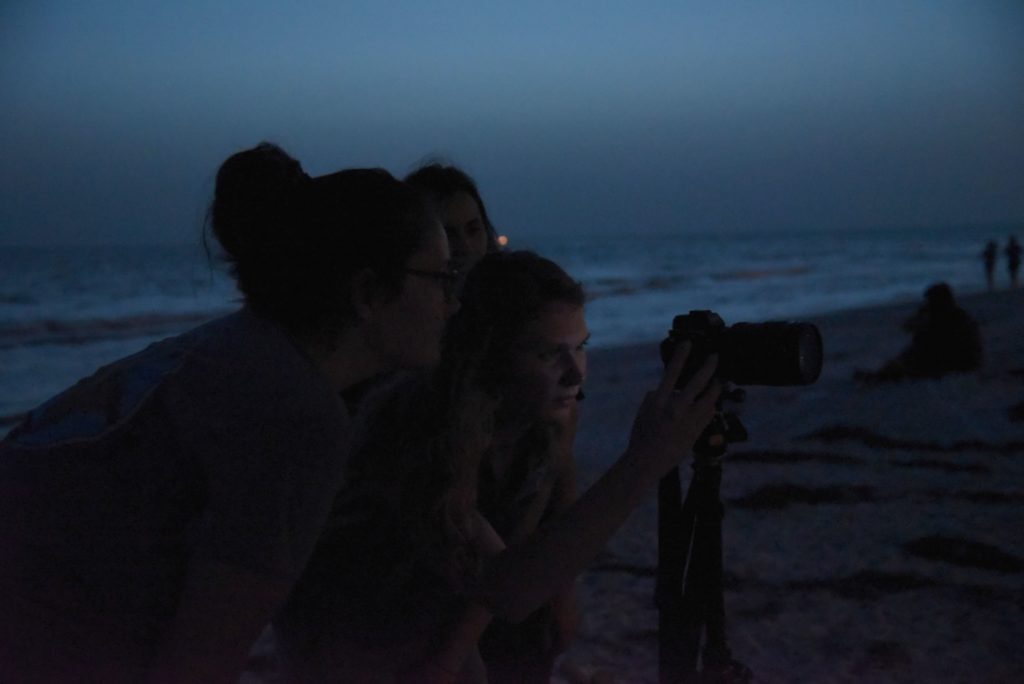
Minimum Qualifications


Salary and Benefits
Applications will be accepted until a candidate is selected. A start date prior to the end of 2019 is preferred. Apply by submitting your cover letter and résumé to the Project Manager at Rachel@conserveturtles.org.

Sea Turtle Conservancy is excited to announce that we’ve made it onto the Top Responsible Costa Rica Eco Tours 2019 list!
Curated by Terra Incognita – a social enterprise seeking to promote the best examples of ethical ecotourism worldwide – we’re part of a group of nearly 40 incredible tours across Costa Rica working to conserve the environment, support the well-being of local people and educate visitors and hosts.
“Costa Rica is often the first place that comes to mind when we hear the word ‘ecotourism’, yet it can still be challenging for visitors to choose a responsible tour,” said Kristi Foster of Terra Incognita.
 The list includes a transparent explanation of how all tours contribute to conservation, local communities and education, and is open to reviews from guests who’ve participated in the tours. Groups on the list are doing everything from cleaning up beaches and donating to community projects, to offsetting their carbon emissions and encouraging their guests to do the same. Some are actively contributing to conservation research, while others are empowering local conservation ambassadors through environmental education and capacity building.
The list includes a transparent explanation of how all tours contribute to conservation, local communities and education, and is open to reviews from guests who’ve participated in the tours. Groups on the list are doing everything from cleaning up beaches and donating to community projects, to offsetting their carbon emissions and encouraging their guests to do the same. Some are actively contributing to conservation research, while others are empowering local conservation ambassadors through environmental education and capacity building.
STC offers several different eco-tour options. Click below to learn more about each trip:

You can view the Responsible Costa Rica Eco Tours 2019 list at www.terra-incognita.travel and join a movement to create positive change for people and planet through travel.
To learn more about sea turtle experiences offered by STC, visit http://stcturtle.org/////get-involved-sea-turtle-experience/
***UPDATE as of 8/7/2019: Great news out of the Brevard County Commission meeting last night! The commissioners rejected the citizen initiative to allow dogs on 11 miles of the Refuge. Most of the commissioners were vocally opposed. In the Carr Refuge District, 92% of those contacting their commissioner via email and phone did not want dogs on their beaches. Commissioners cited both human health and safety and the sensitive habitat as reasons for not supporting the initiative. THANK YOU to all who signed our petition, called and emailed commissioners and spread the word about this harmful proposed initiative! You truly made a difference. If any news breaks about this issue in the future, we will be sure to keep you informed.***
ACTION ALERT: Tell Brevard County Commissioners to keep dogs off the Archie Carr National Wildlife Refuge
Brevard County’s Archie Carr National Wildlife Refuge hosts the single most important sea turtle nesting beach in the United States. The Refuge is a nesting ground for more threatened loggerhead turtles than virtually anyplace else on Earth, as well as for green and leatherback sea turtles. Decades of tireless work and millions of dollars spent by governmental agencies, non-profit organizations such as the Sea Turtle Conservancy (STC), and foundations successfully created and protected the Refuge as a safe haven for sea turtles. A recent movement to open up the Refuge to domestic dogs threatens this progress.
A group of local Brevard residents is pushing forward a proposal to allow dogs on 11.5 miles of the Refuge between 5 p.m. and 9 a.m. daily. STC has extensive experience in monitoring and protecting sea turtle nesting beaches in Florida and the Caribbean. On some of the beaches we monitor, dogs have been documented as a major threat to sea turtles; dogs are excellent at sniffing out turtle nests and digging them up. Dogs are also known to predate live hatchlings ready to emerge and scare off adult nesting sea turtles. Sea turtles, especially hatchlings, have plenty of wild predators without humans introducing large numbers of domestic predators.
This stretch of beach, owned by county, state and federal governments, falls under the U.S. Fish and Wildlife Service management plan that does not allow dogs and cats on federally-owned property. Brevard County would be highly vulnerable to a federal Endangered Species Act lawsuit if this plan moves forward and any impacts to sea turtle nests are documented. The Refuge is one of the most heavily studied nesting beaches in Florida, so any predation incidents by dogs would be swiftly recorded.
This year has been a record-breaking year for sea turtle nesting in the Refuge and across the Southeastern U.S. All three species of sea turtles that nest in the Carr Refuge are just starting to show signs of recovery. The Carr Refuge in Brevard County is the worst possible place to allow dogs on the beach.
Although many staff members at STC are dog lovers, we oppose directing dogs to defecate in the very area where people and children take their shoes off and play in the sand. It is highly unsanitary for people and very dangerous for federally-protected sea turtles.
The Brevard County Commission is meeting at 5 p.m. on Tuesday, August 6 to discuss this proposed plan. Please contact the Brevard County Commissioners listed below and let them know that you oppose opening up the Archie Carr Refuge to dogs.
District 1 Commissioner Rita Pritchett
321-607-6291
D1.Commissioner@BrevardFL.gov
District 2 Commissioner Bryan Lober (Vice Chair)
321-454-6601
D2.Commissioner@BrevardFL.gov
District 3 Commissioner John Tobia
321-633-2075
D3.Commissioner@BrevardFL.gov
District 4 Commissioner Curt Smith
321-633-2044
D4.Commissioner@BrevardFL.gov
District 5 Commissioner Kristine Isnardi (Chair)
321-253-6611
D5.Commissioner@BrevardFL.gov
Funded by a portion of revenues from Florida’s Sea Turtle Specialty License Plate, the Sea Turtle Grants Program distributes funds each year to support sea turtle research, conservation and education programs that benefit Florida sea turtles. In 2019, Sea Turtle Conservancy had two project proposals selected for funding.
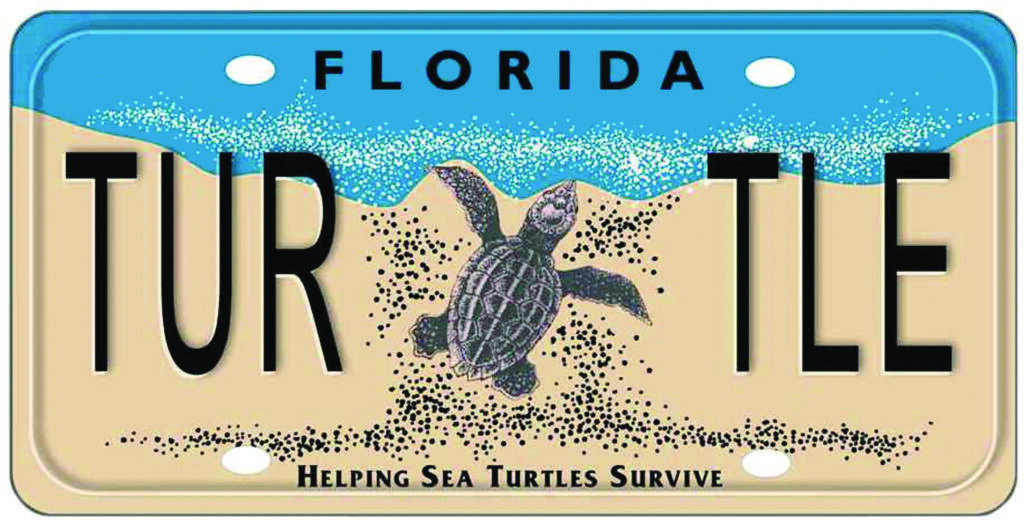
2019
Green Turtle Seasonal Movements and Group Behavior in Florida’s Big Bend – $27,600.00 awarded
In the Florida Keys, green turtles have showed signs of herding or coordinated movements over seagrass habitat. It’s possible this also occurs in the Big Bend during warmer months (May–September), however, it’s unclear how frequent juvenile green turtles actually associate with each other. This project will use telemetry to determine migratory movements of juvenile green turtles due to changes in water temperatures and investigate localized group behavior during the spring, summer and fall. ARGOS satellite transmitters will be placed on juvenile green turtles that are captured at four different sites in the Big Bend. Their movement patterns will be analyzed using state-space models and ArcGIS spatial analysis tools. The results will help explain large scale seasonal movements as well as small scale group behavior that may be impacted in the future by climate change and the loss of habitat.

FWC Permit #118
Upgrading Sea Turtle Lighting Education Program – $18,930.00 awarded
Sea Turtle Conservancy (STC) will refurbish and update the traveling lighting displays funded by the grants program in 2014. Since their creation, the displays have successfully been hosted at facilities throughout the state of Florida and have been viewed by hundreds of thousands of people. The four portable displays have received considerable wear since they were first created and deployed. STC will work with the original graphics company to reprint the panel graphics; add a protective coating on each panel to prevent scratching; and repair and update damaged and outdated fixtures. Once the displays are repaired, STC will re-deploy them in high-traffic locations in southwest Florida, where STC will expand its separately-funded sea turtle lighting retrofit program. STC will also work with a video production company to create a short instructive video to further educate beachfront property owners about the importance of sea turtle lighting and how to be part of the solution. This video will be broadcast to targeted audiences in SW Florida through boosted social media postings.

To learn more about the Sea Turtle Grants program, visit www.helpingseaturtles.org.

Photo credit: Rachel Smith
Nesting season officially kicked off on May 1st in Florida, where about 90% of sea turtle nesting in the U.S. takes place. Whether you are a Florida resident or are simply stopping by for summer vacation, this information will help you get the most out of our beautiful beaches while also being considerate of nesting sea turtles and hatchlings. Share this information with your beach-loving family and friends to ensure that our beaches can be safely and responsibly enjoyed by all!
Human threats that can interfere with the nesting and hatching process include:
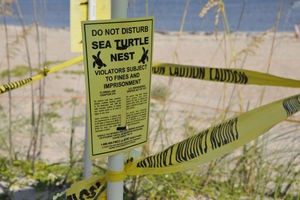 Sandcastles: knock them down! The flatter the beaches are, the easier it will be for nesting sea turtles and hatchlings to safely make it to and from the water. We know you worked very hard on your masterpiece and are sorry to see it go, but the turtles appreciate it.
Sandcastles: knock them down! The flatter the beaches are, the easier it will be for nesting sea turtles and hatchlings to safely make it to and from the water. We know you worked very hard on your masterpiece and are sorry to see it go, but the turtles appreciate it.Want a chance to see a nesting loggerhead sea turtle? Attend a Turtle Walk! STC’s Turtle Walks take place in the Archie Carr National Wildlife Refuge, starting at the Barrier Island Center in Melbourne Beach, FL. Participants have the chance to witness a nesting loggerhead sea turtle. Walks are conducted by STC on Monday, Tuesday, Thursday, and Friday nights in June and July. Space is limited to 20 people per night. Cost is $15 per person. Click here to reserve your spot!
Exciting news! Sea Turtle Conservancy’s main office located in Gainesville, FL is moving to a new building! What does this mean for you? Due to the move, STC will have limited or no access to phones from April 17-22 and limited email access April 19-22.
Any gift Shop or Adopt-A-Turtle orders placed after 5 pm (EST) on Wednesday, April 17 will not be processed until Wednesday, April 24.
We appreciate your patience at this busy time!
Our new address is:
Sea Turtle Conservancy
4581 NW 6th Street
Suite A
Gainesville, FL 32609
All email addresses and phone numbers will remain the same.